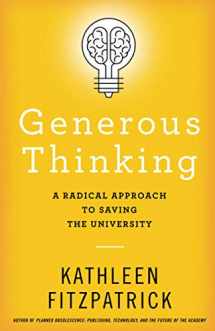
Generous Thinking: A Radical Approach to Saving the University
Book details
Summary
Description
Review
An inspiring and convincing look at how anyone involved in higher education can nurture generosity and help integrate their institutions into their communities to further the public good. With its call for generosity and community-building that is potentially revolutionary, Kathleen Fitzpatrick's Generous Thinking is an indispensable addition to conversations on the state of higher education today. ― Foreword Reviews
For anyone concerned with the future of higher education, Fitzpatrick makes a passionate argument for a simple yet potentially revolutionary idea. ― Library Journal
Generous Thinking offers us a plan to move our national thinking about higher education in a way that enlivens our democracy. ― The Baffler
Generous Thinking is one important step toward recovering the lost value of the university. [Fitzpatrick's] work, which clearly demonstrates how to think generously in the academy, can help make the case for increased public investment in higher education. ― Public Books
A worthy and timely book, and an eloquent example of the critical generosity it advocates. Generous Thinking makes an important contribution to the ever-expanding debate about the role of the humanities in public life. -- Michael Bérubé, Pennsylvania State University, coauthor of The Humanities, Higher Education, and Academic Freedom: Three Necessary Arguments
Kathleen Fitzpatrick is one of the smartest and most nimble intellectuals and theorists working in academia today. In Generous Thinking she challenges us to reimagine the university, the work we do, how we do it, and how we share and evaluate it. Fitzpatrick offers a subtle and thoughtful reflection on the meaning, purposes, and possibilities of the university, which she argues must deepen its embrace of the broader public beyond its walls if it is to survive. This book should be read by everyone committed to determining how to save the public university from its neoliberal handlers and its own self-defeating and self-destructive policies and practices. -- Stephen Brier, CUNY Graduate Center, coauthor of Austerity Blues: Fighting for the Soul of Public Higher Education
This book challenges the competitiveness of academic life and instead proposes a model of community and collectivity. Fitzpatrick calls on professors to engage with each other and beyond the campus. Embodying generous thinking, she is attentive at every turn to the risks as well as the strengths of her ideas. -- Maggie Berg and Barbara K. Seeber, coauthors of The Slow Professor: Challenging the Culture of Speed in the Academy
Can the university solve the social and political crisis in America?
Higher education occupies a difficult place in twenty-first-century American culture. Universities―the institutions that bear so much responsibility for the future health of our nation―are at odds with the very publics they are intended to serve. As Kathleen Fitzpatrick asserts, it is imperative that we re-center the mission of the university to rebuild that lost trust. Critical thinking―the heart of what academics do―can today often negate, refuse, and reject new ideas.
In an age characterized by rampant anti-intellectualism, Fitzpatrick charges the academy with thinking constructively rather than competitively, building new ideas rather than tearing old ones down. She urges us to rethink how we teach the humanities and to refocus our attention on the very human ends―the desire for community and connection―that the humanities can best serve. One key aspect of that transformation involves fostering an atmosphere of what Fitzpatrick dubs "generous thinking," a mode of engagement that emphasizes listening over speaking, community over individualism, and collaboration over competition.
Fitzpatrick proposes ways that anyone who cares about the future of higher education can work to build better relationships between our colleges and universities and the public, thereby transforming the way our society func


We would LOVE it if you could help us and other readers by reviewing the book
Book review



